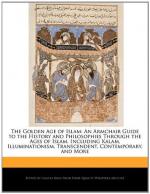|
This section contains 3,428 words (approx. 12 pages at 300 words per page) |

|
Illuminationism (also, Illuminationist philosophy) is the name given to a school of philosophy founded in the twelfth century by the innovative Persian philosopher, Shihāb al-Dīn Suhrawardī (d. 1191), who is well-known by the honorific epithet, "Master of Illumination" (Shaykh al-Ishrāq).
Background
The philosophy of Illumination is a holistically constructed system that aims to refine the period's peripatetic philosophy, which was known predominantly in the corpus of philosophical writings by the acclaimed Persian philosopher and scientist, Abū ʿAlī Sīnā, well-known in European traditions as Avicenna, the latinized version of his name. The intense Greek-inspired scientific and philosophical activity from the ninth to the eleventh centuries, centered mainly in Baghdad (the Abbasid Caliphate's political, cultural, and scientific capital), but also in the emerging centers of learning in Iran (such as the cities Rayy, Hamadan, Isfahān, and Nayshpur) as well as central Asian centers of Pesianate.
Linguistic...
|
This section contains 3,428 words (approx. 12 pages at 300 words per page) |

|


